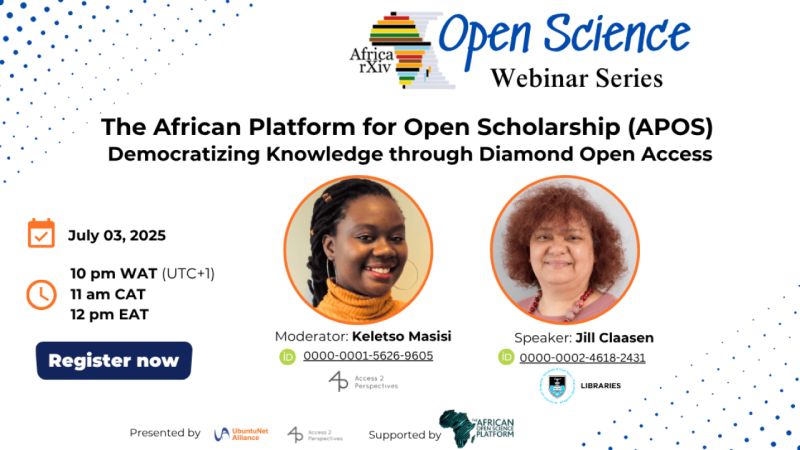The African Platform for Open Scholarship (APOS) is a groundbreaking initiative designed to amplify African research through open and inclusive scholarly communication. Discover how APOS is transforming access, visibility, and collaboration across the continent’s research landscape. This session will feature insights into the platform’s goals, functionalities, and its role in building a robust, equitable knowledge ecosystem in Africa.

Date: Jul 3, 2025
Speaker: Jill Claassen
Session Description
Register: https://ubuntunet.zoom.us/webinar/register/WN_YYf_SSU9Twm1VS52ibsP-g
Speaker’s Profile
Full name: Jill Claassen
Affiliation: UCT Libraries
Role: Librarian, Section Manager: Scholarly Communication and Research
Email: jill.claassen@uct.ac.za
ORCID:
LinkedIn:
Google Scholar:
Jill Claassen has worked in academic libraries for over 20 years and is currently a section manager of scholarly communication and research at the University of Cape Town (UCT) Libraries, in South Africa since 2014. She oversees the institutional repository, OpenUCT, as well as the two open access presses in the library. The one press implements the library publishing service, which includes publishing open access journals and open access monographs & textbooks. This library publishing service provides skills development to African universities to publish their open access scholarship on the African Platform for Open Scholarship (APOS). The second press is the university’s press which publishes monographs only, also on APOS. Jill is currently studying toward a PhD on developing an open access publishing model for the African continent.
Key Takeaways:
- Open Access and Social Justice: Open access (OA) is critical for addressing systemic inequities in scholarly publishing, which often marginalize African research. Platforms like APOS aim to disrupt these hierarchies by providing equitable access to African scholarship (Raju, 2021), (Raju, 2023).
- Diamond Open Access: APOS supports Diamond OA, where neither authors nor readers pay fees, ensuring inclusivity. This model is particularly relevant for under-resourced institutions in Africa (Raju, 2020).
- Multilingual and Diverse Representation: Efforts are underway to include African languages in scholarly publications, enhancing accessibility and cultural relevance (Raju, 2023).
- Collaboration Opportunities: APOS seeks partnerships with other open science initiatives to strengthen its impact regionally and globally (Okune, 2021).
Action Items:
- Engage with APOS: Researchers and institutions are encouraged to utilize APOS for publishing and disseminating their work. Visit the APOS website for more details.
- Advocate for Open Access: Promote OA practices within your networks to enhance the visibility of African research.
- Collaborate: Explore opportunities for partnerships with APOS and other OA platforms to amplify the reach of African scholarship.
- Support Multilingualism: Contribute to efforts that include African languages in scholarly communication.
Resources:
- Webinar recording: YouTube Channel
- Presentation slides: AfricArXiv Repository
- Registration for future webinars: Registration Link
Questions Raised:
- How does APOS ensure long-term preservation of African research outputs?
- What support mechanisms exist for under-resourced institutions?
- How are language diversity and non-traditional outputs addressed?
For further inquiries, contact Jill Claassen at jill.claassen@uct.ac.za.
References
- Raju, R, Badrudeen, A (2021). Social justice driving open access publishing: an African perspective. J. Electron. Publ., 25. https://doi.org/10.3998/jep.1910
- Raju, R et al. (2023). Social Justice: The Golden Thread in the Openness Movement. Publ., 11, 36. https://doi.org/10.3390/publications11030036
- Raju, R et al. (2020). An authentic flip subscription model for Africa: library as publisher service. Library Management, 41, 369-381. https://doi.org/10.1108/lm-03-2020-0054
- Okune, A et al. (2021). Conceptualizing, Financing and Infrastructuring: Perspectives on Open Access in and from Africa. Development and Change, 52, 359-372. https://doi.org/10.1111/DECH.12632
- Nwagwu, W, Ahmed, A (2009). Building open access in Africa. Int. J. Technol. Manag., 45, 82-101. https://doi.org/10.1504/IJTM.2009.021521
